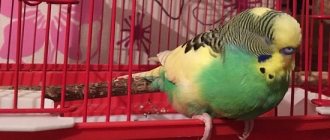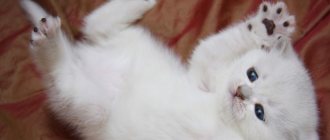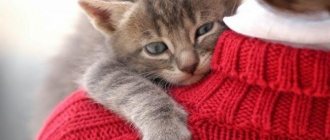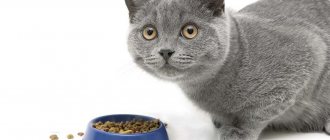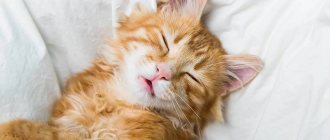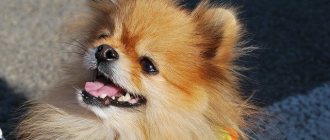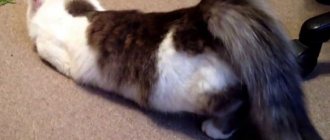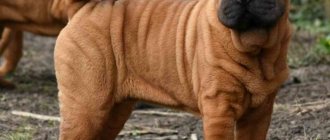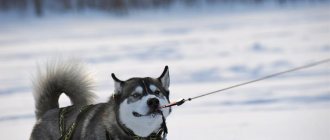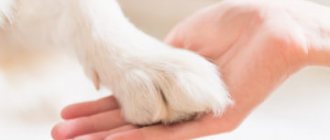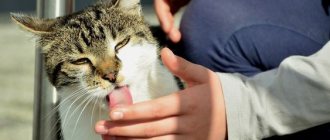Paw licking is one of the most common symptoms veterinarians see. Sometimes pet owners don't even notice that this is abnormal. Only once will the veterinarian ask if a problem has been found. So, how long can a dog normally lick his paws and why might he be licking more than usual?
Dogs clean their paws after they go outside and get wet or dirty. Unlike cats, dogs do not groom themselves on a daily basis and tend to only clean when they are very dirty. So licking, chewing and biting paws at any other time is usually not normal.
Reasons why dogs lick their paws
A dog licks its paws
There are many explanations for why a dog may lick its paws, pads, or even chew on them. If the dog is picky, then most likely, it is simply taking care of itself in this way. It is enough to trace exactly after what she begins to do this: walking, eating or getting ready for bed.
If your dog is licking his pads and paws excessively, but a visual inspection reveals no abnormalities, then there is most likely nothing to worry about.
This animal simply has a greater need for hygiene than its relatives. A condition in which this process becomes an obsession in an animal is considered abnormal. Most of the time the dog licks its paw. Important! To be fair, it is worth noting that even animals that are not big clean people periodically engage in licking their limbs.
Allergic reaction
If a dog has an allergic reaction to any irritant, then one of the signs is frequent licking of its paws. Allergies can manifest themselves to food, to environmental elements (dust), etc. Most often, discomfort in the limbs appears precisely when an animal has a food allergy.
Manifestation of an allergic reaction in an animal
Fungus
If you suspect your dog's paws are infected with a fungal infection, you should seek help from a veterinary clinic. Self-treatment is impossible, since it is impossible to identify the causative agent of the disease at home.
The skin around the nails is especially vulnerable to fungi. Treatment in this case will be long and painstaking, and it will also be necessary to prevent the dog from licking fingers and paw pads treated with antifungal drugs.
Diaper rash
The dog also licks its paws if diaper rash occurs. Long-haired breeds are especially susceptible to this problem. Dogs tend to sweat, just like people. If not properly cared for, sweat corrodes the skin on the paws, causing a burning sensation and redness. Therefore, the pet licks its paws, trying to somehow alleviate the suffering. But due to the fact that the fur does not allow full contact with the skin, relief does not come.
The problem of diaper rash can be solved quite simply: timely hygiene procedures, especially in the area of the fingertips, followed by wiping dry.
Skin inflammation
Any inflammatory processes can be the reason why a dog constantly licks its paw. The problem can appear as a result of cuts or scratching of the upper layers of the skin.
Note! Any, even the most minor, damage to the skin, without timely treatment, can develop into long-term inflammation.
The main symptoms of inflammation are pronounced hyperemia and pain. The dog will constantly want to lick the sore area, and he will whine in pain. When the owner tries to touch a sore spot, he may even show aggression.
Stomach problems
If you have stomach problems, the dog may also start licking its limbs. At first glance, it is difficult to understand why he is doing this, but it turns out that by doing this he is trying to induce a gag reflex in order to alleviate his condition. Most likely, the disease arose due to poor nutrition.
Neurological and mental problems
Problems of this nature can arise if the dog is not walked properly. When an animal is frequently pulled by the leash while walking, a colossal load is placed on its spine, which, in turn, leads to deformation of the spinal column. From here the animal begins to experience pain and discomfort in the muscles. To relieve the unpleasant feeling, the dog begins to bite and lick the front limbs.
Another reason causing a problem of this kind may be a lack of attention to the pet. Out of boredom, he begins to either scratch himself or lick off imaginary dirt.
Sometimes such a “symptom” is nothing more than a bad habit. If dogs lick their paw pads for this reason, then a logical question arises - what to do if a dog licks its paw pads and how to wean the animal from this. The answer is quite simple: you need to spend more time with your pet or you can start using a special spray.
Lack of hygiene
If the owner is not too concerned about the hygiene of his pet, this leads to excessive nail growth. This causes the animal to independently try to get rid of unnecessary processes and injure itself.
Inflammation of the nail bed
Exposure to chemicals
Exposure to chemicals on an animal's skin is doubly dangerous: firstly, the skin itself is affected, and secondly, when starting to lick household chemicals from its paws, the pet runs the risk of serious poisoning.
Meager diet
A dog's diet, like a person's, should be varied and of high quality. If you neglect the rules of a healthy diet for an animal, it may have an excess of protein or, conversely, a lack of vitamins. This is where dryness and tightness of the skin occurs.
Skin diseases
The dog itches a lot and with various skin diseases. The most common are lichen, wet or dry eczema, dermatoses.
Dermatophytosis is often seen in puppies, young animals, and dogs with compromised immune systems. Mycoses cause not only itching, but also hair loss, nodular lesions of the skin, peeling and yellowing of the nails, peeling and cracking of the pads on the paws.
The doctor prescribes treatment of the body with antifungal agents - shampoos (Nizoral, Dermazol) or the drug for dogs Imaverol. For systemic treatment, the following drugs are used - Orungal (Itraconazole), Lamisil (Terbinafine), Nizoral, Oronazole (Ketoconazole).
In healthy dogs, dandruff is absent or invisible. Dandruff flakes can form under the influence of various factors that cause dry or oily seborrhea. When a Spitz itches or the itching bothers representatives of other “sofa” breeds, the cause is dry seborrhea. These animals are bathed frequently, which leads to dysfunction of the sebaceous glands and dry skin. Also, a lack of fat leads to the formation of dry dandruff. If the cause is not a fungal infection or systemic diseases, then the doctor prescribes antiseborrheic shampoos.
Inflammatory dermatitis often occurs in dogs with large folds of skin. If a pug itches, or a chow-chow, bulldog, or mastiff scratches its muzzle with its paws, then it is worth checking the folds, where you can detect redness of the skin and increased humidity, swelling and destruction of the epidermis.
Treatment of dermatoses begins with treatment with antibacterial, disinfectant detergents, and then treated with drying preparations. If the process is advanced, the doctor prescribes antibiotics.
Health problems and licking of front or back paws
First, you need to understand whether there really is a place for problems with the health of the animal’s paws. If the dog pays increased attention to them, then most likely they cause him anxiety, itch or hurt.
If a foreign object is stuck in the paw, there may be a sudden change in the dog’s behavior. Or the animal could simply injure a limb by stepping on something sharp or hot.
Note! Bites from insects or other representatives of the animal world can also provoke a problem in which the dog begins to lick its wounds.
Other possible reasons include:
- an object stuck in the paw or stuck to it;
- the presence of splinters or pieces of plants;
- a growth on the paw such as a cyst or tumor;
- arthritis, bone or soft tissue injuries.
All of the above reasons have a common feature: the dog will lick one paw much more than the other.
Psyche
Unfortunately, many dog owners leave their dogs at home for long periods of time. At the same time, the animal experiences stress, suffers from loneliness and boredom.
They find salvation in their own paws, because a monotonous task is distracting, and thus waiting for the owner to arrive becomes less tiring for them.
Why go far, let's remember tips for getting rid of stress for people: reading, knitting, cross-stitching, drawing, etc. These are all monotonous activities that force you to concentrate and thereby relieve stress.
Only dogs can’t do anything like that, so they came up with this type of activity. It is also a unique way to attract attention. After all, when you see your pet chewing its paw, you will immediately begin to say something displeased to him, but he is only glad to have at least some communication from you.
Therefore, do not neglect your dog, but spend more time with it.
What to do if your dog keeps licking his paws
If your dog licks his paws most of his free time, you need to take a closer look at them. It is especially worth taking a closer look at the interdigital space, as well as the pads.
The purpose of the inspection is:
- searching for foreign objects stuck in the paws;
- looking for cuts, bruises, bleeding, swelling, redness and crusts;
- looking for any other manifestations that are not the norm.
If necessary, the owner must provide first aid to the pet or show it to a veterinarian-dermatologist.
Sore on a dog's paw
Dermatitis
If the paw pads and feet appear normal upon examination, the licking may be due to a skin condition (dermatitis), which is often the result of bacterial problems, allergies, or food sensitivities. Your dog may develop dermatitis due to allergies to chemicals used in your yard, road de-icing products, or even certain types of grass and weeds. Try gently washing your puppy's paws - this may solve the problem.
Behavioral problems and dog paw licking
If the veterinarian has confirmed that your pet is free of disease, then, most likely, a behavioral factor plays a role in excessive paw licking.
Note! Feelings of boredom, stress, fear or anxiety cause the animal to pay excessive attention to its limbs.
It is also likely that the dog begins to lick its paws out of boredom, and this develops into a habit. More severe cases are characterized by obsessive-compulsive disorder, characterized by an obsession with licking paws.
The solution to the problem lies in distracting the animal for extraneous activities: a walk, games, new toys. There is no point in scolding your pet for his need to lick his paw. But you will have to wean him off from doing this in any case.
Infection
Most often, the itching is associated with a type of infection called malasezzia or pityosporum Malasezzia, which is a normal resident of a dog's skin. But if the skin becomes damp or damaged, bacteria use it to multiply, causing severe scabies. This complication of limb licking can be found in up to half of cases because bacteria thrives in the warm, moist folds between the toes. Irritation Many household cleaners can irritate a dog's delicate skin. Getting wet floor cleaner or diluted bleach will certainly cause a reaction such as excessive licking.
In fact, carpet cleaners are enemy #1 when it comes to skin inflammation. Do not use them if you have pets that roam freely around the house.
How to stop your dog from licking sores
Many people wonder what to do if a dog licks its paw until it’s red. Any damage must be treated first. To do this, lubricate the paw with a healing agent while holding the dog by the thigh. A sterile bandage should be applied to the wound. If the dog tries to get rid of it, a veterinary collar will help.
If an animal constantly strives to lick its paws or scratch behind its ear, then it is better to immediately show it to a veterinarian. It is not always possible to determine the cause of this behavior on your own, not to mention the appropriate treatment methods. Some diseases are so serious that the animal can lose a limb without treatment. And many infections can spread to the host.
Prevention
Prevention of dog diseases is a series of simple procedures that the owner should carry out regularly:
- Visit the veterinarian for a general examination at least 2 times a year.
- It is mandatory to have all necessary vaccinations from a very early age.
- It is necessary to regularly groom your dog by bathing and brushing it.
- From time to time it is necessary to independently examine the dog for problem areas on its skin.
- Monitor your pet's behavior and mood changes.
Stories from our readers!
“We have always used fertilizers and fertilizers in our garden. The neighbor said he was soaking the seeds using new fertilizer. The seedlings grow strong and strong.
We ordered and followed the instructions. Wonderful results! We didn't expect this! We harvested a wonderful harvest this year, and now we will always use only this product. I recommend trying it."
Neurological disorders
If your dog is chewing and licking its paws, it may be due to a neurological disorder. But what kind of illness and disease is this? Not really, it is rather an injury that is caused by improper handling of the animal by the owner.
With this disorder, the dog experiences discomfort and unpleasant muscle tension in the neck or back.
Veterinarians increasingly associate the habit of licking the front paws with muscle spasms, cramps and inflammation in the interscapular region, as well as deformation of the lumbar spine.
The thing is that there are many nerve endings coming from the spine and neck that are responsible for the limbs, hence the corresponding behavior in the dog, it is simply trying to report a problem in this way.
But what is the reason, you ask. It lies in such daily attributes of your pet’s life as a collar and leash. Often owners sharply pull the leash in order to direct the dog in the right direction, but this should not be done.
The fact is that with such a jerk, the muscles experience additional tension, which can cause a pinched nerve. Also, if there is a tight collar, it very tightly tightens the neck, and a large number of nerves are intertwined on it.
If you add to such a collar a sharp jerk with the leash, then you yourself understand what the animal is experiencing at this moment.
Therefore, if you notice this behavior, you need to immediately change your walking tactics and buy a different, looser collar for your dog. You should also temporarily limit active games, running and jumping in order for everything to recover.
A veterinarian who specializes in manual therapy will also help you in this matter. If all of the above points are followed, your pet’s recovery will not take long.
External parasites
Quite often, all sorts of parasites, such as fleas, lice or ticks, settle in a dog’s fur. And this is not surprising, because dogs are often walked outdoors, in the forest, where there are a lot of such harmful creatures.
And the city is full of them in parks or even in the bushes under the house. So, these same fleas, lice, and so on can cause a dog to actively lick its paws.
Important! Do not forget to bathe your pet in a timely manner with a special shampoo against fleas and lice to avoid unpleasant consequences.
How this happens: the first place where parasites get is the paws, they settle there and begin to bite. Bites cause severe itching and irritation, plus an allergic reaction to waste products may be added to this.
Physical damage
The simplest and most easily diagnosed cause is physical damage. First, you should take a good look at the paws, pads and even between the toes. Many dogs are quite patient and may not show us that there is a problem that is bothering them during a walk or active time. And the dog remembers her only in a calm state, when he is resting. It could be anything - a cut from glass on the street, a spikelet stuck between the toes and inflammation, hypothermia in winter or summer, paw pads burned on hot asphalt, cracks on dry paw pads, padding in long-haired dogs after bathing.
The solution to the problem is the simplest - remove the cause of the discomfort, process it, and soon this behavior will stop. In difficult cases, contact a veterinarian to treat the injury or abscess and follow the instructions.
Long claws
Another reason for a dog’s increased attention to its paws may be too long nails. They interfere with the animal and do not allow it to fully play or even just walk, therefore, if the owner does not cut his nails, the dog believes that he himself is able to do this with the help of his teeth.
Of course, a dog’s attempts to do his own manicure look very funny, but teeth are not scissors. Not only will the animal damage its nail plate, but its fingers may also be damaged.
Therefore, if you are wondering why a dog chews its paws, the answer may be claws that have not been trimmed for a long time. So arm yourself with scissors and carefully cut off all the excess.
Food allergies
Food allergies can be difficult to determine without a veterinarian
Food allergies are known to cause itchy paws, but they can be difficult to identify, especially without consulting a professional. Your veterinarian may suggest a special diet that involves eliminating certain ingredients from your pet's food to try to alleviate the problem.
